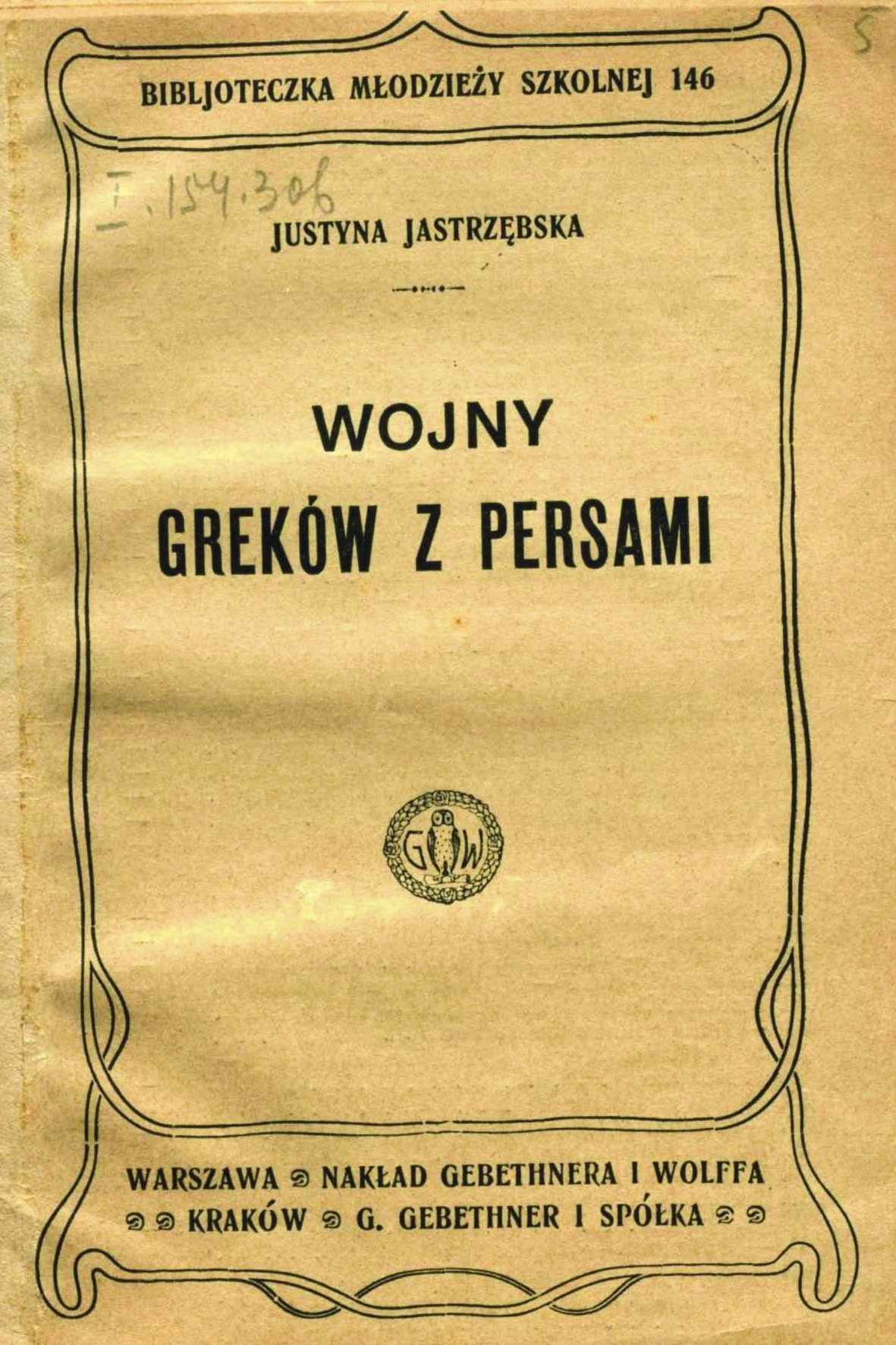Title of the work
Country of the First Edition
Country/countries of popularity
Original Language
First Edition Date
First Edition Details
Justyna Jastrzębska, Wojny Greków z Persami, "Bibljoteczka Młodzieży Szkolnej" 146. Warszawa: Nakład Gebethnera i Wolffa; Kraków: G. Gebethner i Spółka, 1912, 25 pp.
Available Onllne
Polona.pl (accessed: December 18, 2020)
Genre
School reader*
Target Audience
Crossover (Children, teenagers)
Cover

Biblioteka Narodowa, retrieved from Polona, public domain.
Author of the Entry:
Summary: Małgorzata Glinicka, University of Warsaw, muktaa.phala@gmail.com
Analysis: Marta Pszczolińska, University of Warsaw, m.pszczolinska@al.uw.edu.pl
Peer-reviewer of the Entry:
Katarzyna Marciniak, University of Warsaw, kamar@al.uw.edu.pl
Elżbieta Olechowska, University of Warsaw, elzbieta.olechowska@gmail.com

Justyna Jastrzębska
, 1889 - 1944
(Author)
A historian, educator; she authored the following books: Bogowie greccy i rzymscy. Najważniejsze wiadomości z mitologiii [Greek and Roman Gods. The Most Important Information from Mythology], 1911; Wojny Greków z Persami [The Graeco-Persian Wars], 1912, and Dzieje powszechne. Podręcznik dla seminarjów nauczycielskich [General History. Textbook for Teachers’ Colleges], ed. pr. 1920 (a popular book; subsequent editions: 1922, 1925). Translator of French historical and educational books.
Bio prepared by Małgorzata Glinicka, University of Warsaw, muktaa.phala@gmail.com
Summary
Based on: Katarzyna Marciniak, Elżbieta Olechowska, Joanna Kłos, Michał Kucharski (eds.), Polish Literature for Children & Young Adults Inspired by Classical Antiquity: A Catalogue (accessed: June 11, 2021), Faculty of “Artes Liberales”, Warsaw: University of Warsaw, 2013, 444 pp.
The text describes the history of armed conflicts that took place in 499–449 BC. between the Persian Empire and Greece, a country, metaphorically, tiny as the surface of a shield, but capable of acquiring immortality – later recognized as the mother of European civilization. According to the author, the sons of Greece, full of love and toughness, willing to sacrifice for the general good, after many years of struggle, unexpectedly, won independence for Greek colonies.
Analysis
The author prepared a short history lesson for children (about 20 pages) about Graeco-Persian wars and at the same time used the topic as a hidden lesson in patriotism and moral fortitude. She introduces a statement that "Greece was strong through its culture. The sovereign state structure of Greece (democratic republic) was then already in existence, as was the sense of patriotism and, most importantly, the elevated virtue of the people for whom the common good of the country was more important than their own affairs"* (p. 4). Not explicitly, but rather indirectly (due to Russian censorship in place at the time), she alludes to the situation of Poland under foreign occupation and Poles dreaming of real independence. Her attitude is expressed in the use of language, she obviously sympathizes with Milesians who undertake an uprising against Persians, she gives absolution to Athenians who kill Persian messengers requesting water and land as a symbol of submission, she thinks that between "chains and shame or death and tomb" (p. 9), the only right choice is the latter; she shows emotion presenting Athenians as "fighting with the enthusiasm of defenders of their beloved homeland" (p. 10), doing it "for themselves, their families, their ancestors’ tombs and honour" (p. 10), willingly, not on command, as the Persians did. According to her, "the moral strength of soldiers is more important than their numbers" (p. 22).
Before the war begins, the ground is already prepared for the readers not to be a passive student/witness sine ira et studio, but rather, a supporter who accompanies the Greeks in their fight for freedom, that is more precious than life. As for the course of military action before and during the battle of Marathon, the author relies on Herodotus’ description, whom she briefly acknowledges but without a proper reference. Then she describes the end of Miltiades, the characters of Themistocles and Aristides the Just, and Athens’ political and economic life before the next invasion. The only hostilities of the second Persian war described in the booklet are: the defense of Thermopylae, the destruction of Athens, and the naval battle of Salamis. The battle of Plataea and some military actions against Mardonius are only mentioned. The point is that the events are not as important as the author’s constant commentary, for Persians representing Asia, pejorative adjectives and nouns, and a vocabulary full of admiration and pathos when describing Greek moral force and supremacy, their patriotism and love for freedom.
Some minor historical inaccuracies are unimportant because the author subordinates everything to one goal – providing a lesson on how to appreciate freedom and love one’s homeland more than life itself.
The sources provided in the footnotes are Herodotus, Plutarch and Gustav Hertzberg’s Hellas und Rom published in 1879, where the “quote” comes from about the Athenian response to Xerxes.
* All translations of the Polish quotes are by the author of the entry (Marta Pszczolińska).


